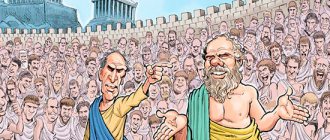Greetings, friends!
Surely you have come across people who manage to convincingly defend their point of view, even when they are obviously wrong. In Ancient Greece, there was a whole philosophical movement, within the framework of which those who could prove that they were right while being wrong were considered truly wise people. This movement was called sophistry, and its supporters were called sophists. Today we will look in detail at what sophistry is, learn the history of its appearance and development, and consider examples of sophistry. Let's begin!
What is sophistry?
Sophistry is one of the trends in ancient Greek philosophy that arose in the 5th century BC. The Sophists have long been among the most revered philosophers, considered sages by their contemporaries. They were eloquent, thanks to which they could win almost any dispute. But over time, the attitude towards the sophists changed. If initially they were considered sages, then later they began to be treated as resourceful and dishonest demagogues.
Classical sophistry as a philosophical doctrine did not exist for long - in the 5th and 4th centuries BC. Later, new sophistic movements arose, but they also quickly ceased to exist. Today, the term "sophistry" is used to refer to a special form of argumentation that misleads by making points that appear logical. Such theses are called “sophisms.” They may use logical errors, polysemy of some terms, substitution of concepts, accepting false statements as true, non-obvious violation of the laws of logic, and other techniques.
In modern philosophy, sophistry is the deliberate use of sophistry to mislead people. This technique can be quite effective. The logical error embedded in a statement is often so well disguised that it is difficult to find without deep analysis. Therefore, the use of sophisms is condemned and subject to well-founded criticism.
Protagoras
He was the first to call himself a sophist. Spoke with Pericles. Like Anaxagoras, he was expelled from the city. He was expelled for writing “On the Gods.” This book is the first to be destroyed at the behest of the state. There were these lines:
“I cannot know anything about the gods, whether they exist or not: the darkness of the subject and the brevity of human life hinder this.”
“Why do you, Protagoras, want to know the gods with your mind? - asked the Athenians - “We must do the same as everyone else.” It is clear that this could not be allowed to happen.
Next we will consider the philosophical in the sophistic teaching of Protagoras. He succeeded Zeno of Elea and Heraclitus. The real basis for sophistry is there: “Everything flows.” But the sophists have their own conclusion: “Since everything flows, then it can therefore be everything that it seems to someone.” Since everything flows, do we know what it is like in itself? No, and, therefore, it is what it is for us. People's feelings are changeable and the same person perceives everything differently. What's the wind like? Neither cold nor warm, but such, Protagoras would say, as he is perceived. A sick person finds food bitter, a healthy person finds it sweet. So what is it like in itself? Just as it seems.
No thing should be spoken of as it is in itself. She is what anyone perceives her to be. It is such because it is in relation to man. Nothing is one thing in itself, but everything is in relation to another and only in this way, according to Protagoras, can it be assessed. And, therefore, all opinions are equal; none of them can be said to be false. You cannot argue with a person who is cold in the wind, even if the wind seems warm to us.
Hence the principle of Protagoras’ teaching:
“Man is the measure of all things: those that exist, that they exist, and those that do not exist, that they do not exist.”
And if something doesn’t exist for someone, then it doesn’t exist (for him). Consequently, the existence and non-existence of things is in the power of man. No one can determine for the person himself what this or that thing is for him. “You know, this thing is like that for you,” we say to each other. “Sorry, I know what it’s like for me.”
The Protagoras principle is the first formulation of human freedom.
Why is man a measure?
Because he realized himself as a thinking being. You cannot be a thinking being without knowing that you are the measure of all things. In relation to finite things, man is absolutely free. What is behind the Protagoras principle? One: awareness of the absolute power of the human mind over individual things. Anaxagoras paved the way for him: “The mind rules the world.” The small mind rules the human world, the world to which a person belongs. The human mind is the measure of everything individual.
Educating the human understanding so that it can handle things freely is the principle of the Sophists. An educated mind knows that it can do anything with things. An uneducated mind does not know that it can do everything with things, and therefore cannot do everything. Let us emphasize: reason has absolutely omnipotent power over individual things, and not absolutely power in general. Why is the educated mind omnipotent? Because he has power over himself, but the uneducated has no power over himself, he is spontaneous. Why is he omnipotent over individual things, and not in general, because to control oneself for an educated mind means to control one’s own attitude towards individual things - no one can indicate to an educated mind exactly how it should treat a thing, no one can determine for it what she is for him.
How does reason command?
The mind can do whatever it wants with its ideas about things. For example, the idea of a glass. What is a glass? The uneducated mind knows that this is a drinking device. He has the experience that you can drink from a glass, that the glass allows you to do this with him. An educated mind knows what it can do with a glass - everything that it imagines about it: throwing, covering flies, turning the glass into a zoo - you watch and have fun. You can also use an antique glass as an investment; great gift for a friend.
How many actions can the mind perform with a glass in its mind? Infinite quantity. Reason can decompose the one into many. The certainty of my idea depends on someone. From no one! Sophistic teachers of rational thinking raised the mind from a state of spontaneous, naive thinking to an educated state. It’s one thing to be a slave to things, and another to be a master. But so do people. You can decompose any idea into many ideas, highlight those aspects of it that are important to you and convince others of this. What's opening here? The danger of arbitrariness: what I need, I will allocate; there is a danger of presenting one’s goals as the universal, the partial as the whole.
Nowadays, all more or less educated people are their own sophists. Whether or not to go to class in the morning is our decision (although, of course, there are those who do it automatically). I wonder what? The fact that whether our decision is “for” or “against”, it can be well justified by us! That is, reason can justify what is important for us as necessary in general. Why is this possible? Because reason gives finite definitions, and their “infinite” number, therefore, can be chosen to suit your taste. In this rational way, you can justify anything. This is the dangerous side of an educated mind.
An uneducated person under the rule of tradition is constant. And education opens up scope for arbitrariness. That’s why rulers hinder education—it’s easier to govern, and you don’t even need to govern—tradition, the status quo, governs for them. The Sophists showed that there is something in a person that allows him to be free. But since this freedom is rational, this freedom is arbitrariness. This is the great danger of education. Greek society felt that there was danger here, because... Greek society was a traditional society. Man has become able to live by his own mind, and, therefore, independently of others: the unity of the state and society is destroyed.
And from a philosophical point of view, it was generally a scandal. Philosophers spoke about true knowledge and opinion, but now it is over: every opinion is true as long as a person adheres to it. If he doesn’t like it, he’ll choose a different point of view and justify it.
Absolute truth has disappeared!
They say: “Humanity needs to seek the truth.” “Come on, an educated person does not need to seek the truth,” say the sophists. Truth appeared as something relative. Opinion turned out to be the most important. What kind of divine logos there is - this is only the opinion of Heraclitus. Form your mind, and your opinion will become absolutely equivalent to any other opinion. It began to seem that a person was not given anything more than to come up with opinions. Philosophy became popular - everyone could philosophize from the heart. “What is truth?” “Something united,” they said earlier. “Come on, does she exist?” - the educated sophist waves his hand.
Any relativism is based on sophistical thinking. It is precisely from the realization that anything can be proven by rational means that the opinion arises that nothing definite can be known. There are reasons to steal and there are reasons not to steal. What is important to me, I decide for myself. Terrible danger. If there is no absolute truth, then everything is permitted. If truth is relative, then it is impossible to know anything at all. Gorgias justified this.
History of sophistry
This philosophical movement arose in the 5th century BC. It was created by philosophers who called themselves sophists. Back then this word had a positive connotation. The Sophists themselves positioned themselves as teachers of wisdom. They taught other people philosophy, logic and, of course, rhetorical techniques. Very quickly they realized that the ability to prove any idea replaces real knowledge, so it was this skill that they taught their students.
In fact, the activities of the sophists quickly came down to the search for the most effective methods of arguing, usually dishonest. These techniques consisted of substitution of concepts, deliberate concealment of logical errors, and even psychological pressure. And in order to defend their right to such an approach, the sophists created a special philosophical ideology, within the framework of which it was argued that objective truth cannot exist. And if a person is able to prove a certain statement, it can be considered true.
The history of sophistry consists of two periods, which are conventionally called “senior” sophistry and “younger” sophistry. The most famous representatives of the “older” sophistry are Protagoras, Gorgias, Hippias and Antiphon. Among the “younger” sophists, the most famous are Critias, Alcidamas (Alcidamas), Callicles, Thrasymachus and Lycophron. Almost all the sophists were very rich people, since the rich willingly took wisdom lessons from them. At the same time, they were treated unkindly in society (they even got along poorly with each other and often got into arguments).
Development of the concept "Sophist"
In the 5th century BC in Ancient Greece, a society of erudite teachers emerged who set themselves the goal of teaching their students the ability to argue (primarily for students to build their political careers). They introduced young people to the basics of history, law, mathematics and philosophy. But first of all, they taught methods of proof and refutation, discovered a number of rules of logical thinking, but soon, when victory in an argument became more important than proof of truth (which is important in politics), all attention was focused on developing logical tricks based on the external similarity of phenomena, on the fact that that an event is extracted from the general connection of events, from the polysemy of words, from the substitution of concepts, etc. These intellectuals were also called sophists.
Examples of sophistry
As we have already found out, sophistry is the deliberate misleading of another person through manipulation of wording. One of the classic examples is the so-called “Evatlov sophistry.” This case has been preserved in history due to the fact that the sophistic technique was used against Protagoras (one of the most famous sophists) by his own student.
Protagoras agreed to give lessons to Euathlus under unusual conditions: he would pay him for his tuition only if he won his first trial. After finishing his studies, Evatl did not take up any business, and therefore refused to pay. The indignant Protagoras threatened Euathlus with court. However, if Evatl wins in court, he would not pay due to the court decision, and if he loses, he would not pay, because still haven't won a single case. Thus, Evatl outwitted the teacher, because regardless of the court’s decision, he would have been right and could, on completely legal grounds, not pay for tuition.
To better understand what sophistry is, it is advisable to look at other examples. There are a huge number of such statements that look logical, but are based on false facts. Let's look at a few popular sophisms:
- A passenger is traveling on a train. The train is traveling to Moscow. This means that the passenger is going to Moscow (sounds quite logical if you ignore the fact that the passenger can get off long before the final station).
- If two halves of different objects are equal, then the objects themselves are equal. Two glasses half filled with water are equal. Therefore, an empty glass is equal to a full one.
- If the medicine is useful, then it must be taken constantly. But they don’t take it all the time, because the medicine is harmful for a healthy person. Then why does a sick person take it if he is already feeling bad?
The well-known logical reasoning that the crocodile is longer than the green one is also built on a sophistic principle. And even in such an exact science as mathematics there is a place for sophisms. Surely you have at least once seen the “proof” that 2 x 2 = 5. Typically, such mathematical tricks are based on the fact that at some stage of the calculation an implicit division by zero occurs.
There is also an example about an athlete who supposedly will never catch up with a turtle. However, not everyone notices that at each iteration the frame of reference is deliberately chosen so as to never reach the point where the athlete actually overtakes the turtle.
By the way, to use sophistry it is not necessary to have a high IQ, any special skills, or even cunning. You can do it even without knowledge of logic. Surely you have at least once encountered such a phenomenon as cyberbullying (what is it?). Usually a more aggressive person puts pressure on his opponent with phrases like “Give me your address if you are so brave.” And it even sounds logical: if a person is brave, then why doesn’t he give his address?
Reasons for the appearance of sophistry in reasoning
There are several groups of reasons why a person begins to use syllogisms in argumentation. The reasons are intellectual, affective and volitional. Let's look at each of them in more detail.
Intelligent
These reasons are directly related to the intelligence of both sides of the argument. A more intellectually developed person can use sophistry if he knows for sure that:
- His opponent lacks knowledge in the area under discussion;
- If the opponent is too lazy to think, does not understand the flow of the argument and does not control it.
Affective
This category includes situations in which the “sophist” does not want to use his intelligence or simply lacks intelligence. Therefore, he simply appeals not to scientific concepts, but to feelings and emotions. A sophist who wants to succeed must understand psychology and skillfully find the weak points of his opponent. This awakens vivid feelings in the opponent’s soul, which cloud his thinking and do not allow him to draw logical conclusions. In addition, the rush of emotions often makes it impossible to think at all. Disputes in which the opponent avoids discussion and settles personal scores will also be considered.
Strong-willed
When the parties exchange opinions on any topic, they influence not only the emotions and feelings of the interlocutor, but also his will, since each argument contains an element of suggestion. This is expressed in facial expression, tone that does not tolerate objections, etc. However, not every enemy succumbs to this; it usually affects those who are passive and easily influenced.
The reasons for the emergence of sophistry are ambiguous
Peculiarities of the teachings of the “senior” sophists
The first sophists sought knowledge. At the same time, they started from the fact that the knowledge accumulated by mankind is mostly erroneous. Today it is their teaching that is talked about first of all in order to explain what sophistry is. They explored the problems of all the sciences that existed at that time and doubted established religious beliefs. In fact, the “senior” sophists were initially skeptics who subjected absolutely everything to critical rethinking. They didn’t deny anything, they simply voiced the pros and cons.
All “senior” sophists can be divided into three groups:
- Speakers
. Representatives of this group had a perfect command of the language and were able to beautifully argue their point of view. - Erists
. These were debaters who participated in an argument for the sake of an argument. They sought to win the controversy at any cost, which caused universal condemnation. - Politicians
. These sophists used their skills and knowledge to achieve political goals.
Among the senior sophists, Protagoras is the most famous. He was, of course, a very smart and wise philosopher for his time. It is believed that it is from him that the main thesis of sophistry comes that man is the measure of all things , and the essence of all phenomena is determined by how a person perceives them.
Protagoras emphasized the relativity of truths, denying their absoluteness. It is also believed that it was this philosopher who first put forward the idea of a democratic society. He also talked a lot about how, with the help of correct argumentation, lawlessness can be defeated.
Protagoras' most famous student was Socrates, who stood out for opposing his teacher and other sophists. Instead of rejecting the existence of absolute truth, he believed that such truth exists, and it is determined by the divine essence.
Another famous "senior" sophist was Gorgias. He believes that it was he who created rhetoric. His statement is known that one action can be considered both bad and good - it all depends on the point of view. Also preserved in history is the name of Hippias, who became famous for his eloquence. His lessons were highly valued, and he managed to get rich, while maintaining, unlike most sophists, his good name.
Socrates
The outstanding ancient Greek philosopher Socrates is usually considered to be among the sophists, but his teaching differed in many ways from the teaching of the sophists:
- the main method of Socratic philosophy is “maieutics” - the search for truth through a chain of logical conclusions; The task of a philosopher is not to give a person a ready-made truth, but to help him come to this truth himself;
- the truth was achieved through dialogue or discussion in the form of question and answer. By the end of the dialogue, a definition of truth should have been achieved as not contradicting itself. This was manifested in the fact that the opponent came to contradict himself and the original theses, which Socrates drew attention to. This approach was called dialectics.
Peculiarities of the teachings of the “younger” sophists
This part of the history of sophistry has not been preserved very well, so there is little reliable information about the “younger” sophists. Famous representatives of the movement were Lycophron, Alcidamas, Thrasymachus, Callicles and Critias. Their ideas were based on the following theses:
- there should be no barrier between social classes;
- elite is an artificial concept, an invention of a group of people;
- nature created every person free, there should be no slavery.
The younger sophists talked a lot about ethics and morality, as well as about freedom and rights. In particular, Thrasymachus supported the ideas of democracy, extolled atheism and criticized religions.
Results
The conclusions of the sophists are not sophistry. These conclusions are true about this thinking - about reason. If our thinking is only rational, then everything that Gorgias said is true: if thinking is truly separated from the object, then such thinking cannot know anything about the object in itself. Reason knows that it is the master of things, but it still does not know why it is the master. He is pleased with this find and happily amuses himself with it.
Reason contradicts itself. Reason itself does not go beyond the boundaries of opinion, but within these boundaries it is free. A person with an educated mind is one who can prove both of the same things. The moment of truth for the sophists is the awareness of the power and powerlessness of reason: absolute power over individual things and powerlessness before the truth. He is so powerless that he declares that there is no truth. The question is: does he claim the truth? Yes, there is no truth, but only as an individual thing located outside of us. What if truth is not a thing?
The own contradictions of the sophistic way of thinking became the starting point for Socrates' philosophizing.
Type of activity of the Sofia school
Schools of oratory were first mentioned in the 5th century in Sicily. But it was Athens that became the public arena for the educational activities of the Sophists. The doctrine touched upon the epistemological problem of philosophy. Adherents of the ancient school tried to teach followers to refute the conclusions of political opponents with the help of evidence and reasoning. In this endeavor, they encountered socio-political problems, for the sake of solving which they dealt with general questions of truth and falsity. It follows from this that philosophy, represented by the teachings of the Sophists, is an important direction in the science of thought in general.
Leading a traveling lifestyle, the sophists performed in front of everyone who wanted to learn eloquence. They “toured” cities, using pedagogical rhetoric to unite groups of people differing in age, gender, and social status. The sages made a huge contribution to the development of society - they cultivated an understanding of the importance of not only physical and spiritual education, but also mental education. Education acquired the highest value and became widespread. “An educated person is confident in himself, able to withstand the crowd, strong in thought, his weapon is the word,” thinkers were guided by this motto.
Due to their “wandering” lifestyle, the Sophists did not have a developed system of knowledge. The manuscripts have not survived to our time; we can study sophiology only on the basis of the works of philosophers of the late period.











